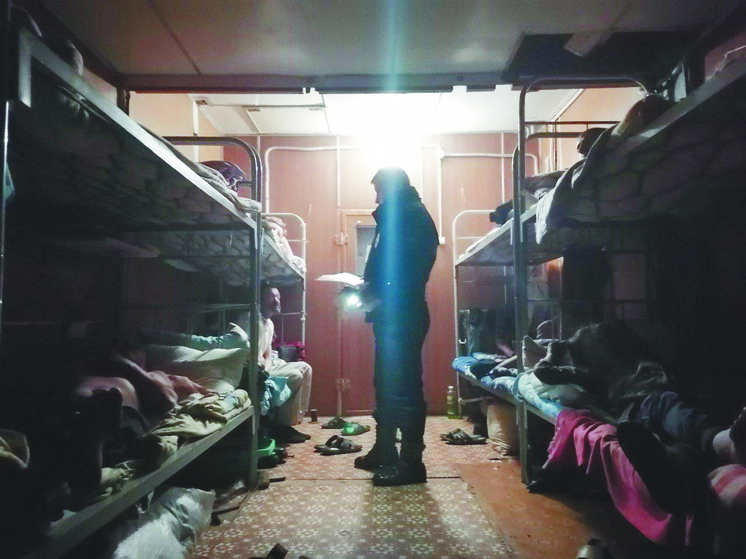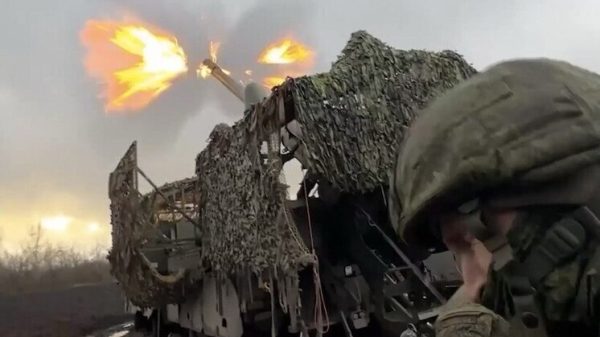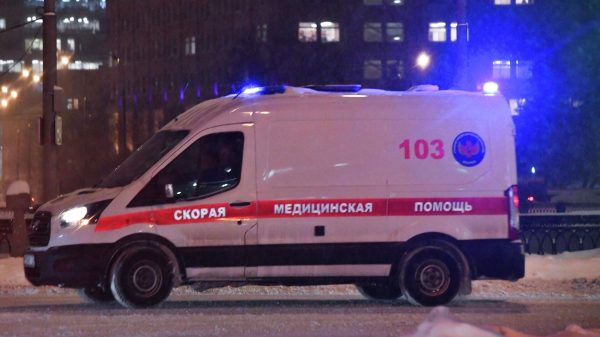Russians are more likely to become victims of the slave trade
The number of slaves in the world in recent years has reached, according to some estimates, 50 million. Modern slaves are not much different from those who were, say, in the Middle Ages: they are deprived of documents, contact with relatives and any rights at all, including the right to health (and their own organs) and life.
The human trafficking industry in the 21st century, as terrible as it sounds, is developing and acquiring increasingly monstrous forms, despite the attempts of the international community to counter it. Russians are also more often now becoming its victims.
On the eve of World Day Against Trafficking in Persons (July 30), we talked about all this with one of the leading experts in this topic, Vera GRACHEVA.
 Photo provided by Vera Gracheva
Photo provided by Vera Gracheva
According to the Judicial Department of the Supreme Court of the Russian Federation, in 2023, Russian courts handed down guilty verdicts:
119 persons under Article 127 of the Criminal Code «Illegal Deprivation of Liberty», which is 4.39% more than in the previous year (there were 114).
17 — for human trafficking under Article 127.1 of the Criminal Code (in 2022, there were 11).
369 — under Articles 240 and 241 of the Criminal Code «For organizing prostitution and involving in this activity» (in 2022, there were 384).
48 — under Article 242.2 of the Criminal Code «Use of a minor for the purpose of producing pornographic materials or objects», which is 2 times more than last year's figure (there were 24).
0 people were convicted under Article 127.2 of the Criminal Code of the Russian Federation «Use of slave labor» (there were 2).
«Please help a 67-year-old father free his five children from slavery» — this is how the appeal to me as a human rights activist and member of the Human Rights Council begins. «He came to Moscow from Namangan (Uzbekistan). In 2009, his four sons and a daughter went to Moscow to earn money, ended up at a garbage dump, from which they never left for 15 years… The old man secretly went there at night, talked to two sons, but they refused to run away from the dump, said that the owner would kill and bury the rest of the brothers and sister. He contacted the embassy, where they sent him to the OMVD. He wrote a statement to the police. But they did nothing. The last time my father came to the dump together with the police, but the owner of this place said that he did not have Uzbeks, only Tajiks worked, and the old man allegedly went crazy or was lying.»This is one of a dozen requests that the author of these lines has received recently. More often than not, it is impossible to help potential slaves (I write this carefully, because they themselves, out of fear or for some other reason, may refuse to recognize themselves as victims). One example that MK wrote about: a man bombarded the authorities with requests, trying to rescue his beloved (she is an orphan, raised in an orphanage) from sexual slavery. He is sure that she is being held in a brothel and forced to engage in prostitution. The police found the girl, but she said that no one was holding her and asked not to bother her anymore.
Law enforcement agencies generally have a hard time sorting out such stories. However, this year several criminal cases were opened in the Moscow region (one in Ramenskoye, the second in Balashikha) on the fact of labor exploitation of people in so-called workhouses and forced begging.
Many told their stories to human rights activist Vera Gracheva and volunteers, and they (with the consent of the victims) told the police. I will cite some of them.
A man named Sergey escaped from the berry picking fields and contacted human rights activists, telling them about another «slave» named Bulat. Before that, a woman had contacted them, asking for help for her husband. When they found out the man's details and his location, it turned out that they were talking about the same person — Bulat Akhmadeev. Volunteers arrived at the address of an agricultural farm in the village of Troekurovo in the Lipetsk region indicated by Sergey. It turned out that various contractors were involved in recruiting personnel and organizing work on picking fruits and berries. One of them, a Moldovan, was recruiting people in the square of three railway stations in Moscow. It was there that he met Bulat and a woman named Nadezhda (she came to Moscow to look for work). As a result, they all ended up in the village of Troekurovo, where they immediately found themselves in the position of slaves. They worked a lot, ate half-starved, and were subjected to physical punishment. When Nadezhda decided to leave, one of the foremen brutally kicked her and took her passport.
Nadezhda's passport was returned only when volunteers and police officers arrived there. Bulat and Nadezhda were also paid 10,000 rubles each as salaries.
When Anatoly was left without a job, his friends suggested that he contact Ruslan, who helps with finding a job at the Kazansky railway station in Moscow. As a result, the man agreed to work as a security guard at a farm with a salary of 30,000 rubles a month and went to Stavropol Krai.
Upon arrival, Anatoly met Abdul. He immediately dotted the i's: Anatoly would not be able to leave for at least six months, since Ruslan had been paid 50,000 rubles for him. Sold, basically. Last month, Anatoly and two other «slaves» were helped to organize an escape. Now they are all in a safe place.
It is about several men who ended up in a workhouse in the Moscow region.
Dmitry was literally kidnapped from the street. Late in the evening of June 8, he was returning from work, got off at the station, where he was met by strangers. They sprayed pepper spray in his face, beat him up, and put him in a car. They took him to the workhouse, from which he could not leave voluntarily.
Ravil came to earn money from Izhevsk, but became a victim of theft. He was sitting on a bench, deep in thought, when a man approached him with an offer to go to the workhouse. Ravil agreed. And then he couldn’t leave.
Alexander came to earn money from Donetsk, where he had a mother, whom he wanted to help. The man was waiting for a train, when young guys Kirill and Dima approached him. They insisted that Alexander should go with them, after which they put him in a car and took him to the workhouse. The man himself didn’t understand how he agreed.
Pavel was returning from work at night, near the Hippodrome station he saw men forcibly putting his grandfather into a car. Pavel decided to stand up for himself, for which he got punched in the jaw, after which he himself ended up in the workhouse.
— A criminological process consisting of a chain of interrelated criminal acts. At the beginning, recruitment using deception, fraud, abuse of a vulnerable position. And at the end, the most brutal exploitation in captivity and the receipt of criminal income by «employers» (and at the same time by recruiters, who get from 11 to 26 percent of the transaction). Human trafficking brings criminals, according to rough estimates, 236 billion dollars a year. This is the money that was earned by victims of human trafficking and forced labor, but was not paid to them.
This definition itself was formulated in 2000, that is, a quarter of a century ago. During this time, humanity (including lawyers, human rights activists, law enforcement officers) has accumulated a large body of knowledge about human trafficking. This process itself is developing very dynamically and constantly confronts us with the need to solve new and new problems.
This topic was reflected in Russian legislation in 2003, before the UN Protocol on Trafficking in Persons was ratified. Two articles were introduced into the Criminal Code: on human trafficking and the use of slave labor, but they also need to be adjusted. Not only do they not fully comply with the international definition, but they lag even further behind current challenges.
— Today, human trafficking as a global criminal market is ahead of the organization of illegal migration, illegal trade in weapons and drugs in terms of its volume.
In Europe, human trafficking for criminal exploitation has increased in recent years from 47% to 63%. Human trafficking for the purpose of sham marriages has increased from 23% to 39%. More than half of European countries report an increase in human trafficking for the purpose of pornography production, webcam exploitation, and remote sexualized violence. More than 30% of European countries report the exploitation of people with various forms of disabilities.
In general, the problem became widespread on a global scale in the 90s of the twentieth century, which is associated with the Balkan crisis (it caused flows of refugees and increased demand for sexual services in connection with the deployment of peacekeeping contingents, etc.). The next peak of growth is the pandemic period. A new surge in the vulnerability of the population in all countries, plus the growing process of digitalization of human trafficking, that is, the use of ICT in the recruitment and exploitation of victims, advertising their services, problems of detection due to the anonymity of transactions.
— Alas. And there are objective factors for this. Russia is a transit country for migrants who go to Europe. It itself accepts a large number of guest workers, refugees, and internally displaced persons. But this is not the only reason. Human trafficking within the country poses a much greater threat.
International organizations estimate the number of victims in the range from 700 thousand to 1.9 million people. Some experts put the Russian Federation in 8th place in the world. It is impossible to confirm or refute this idea of the potential number of victims, since independent national monitoring of the state of the problem is not carried out (and judging the prevalence of the threat by the number of criminal cases would be an extremely dangerous illusion). However, the likelihood of approaching these estimates is high due to the high level of vulnerability of the population and the absence of a serious system for combating human trafficking (and at the same time, the exceptional profitability of the criminal business against the backdrop of a tiny probability of detection).
— In addition to people belonging to risk groups (the poor, the homeless, the disabled, etc.), a new vulnerable category has recently been identified — young specialists in the field of new information technologies. They are recruited for exploitation by criminal groups involved in cybercrime. As a rule, these are transnational cases, and their number is growing. Another new group that requires close attention is military personnel on their way home from the SVO area. There are cases of their deception, recruitment and resale for the purpose of slave labor.
In general, the number of men and boys among identified victims of human trafficking has increased; they are used in forced labor, criminal activity (there has been a noticeable increase in cases over the past five years) and in mixed forms of exploitation. At the same time, the number of women and girls among identified victims, regardless of the form of exploitation, still makes up the majority.
— I think the reason is the lack of special training for judges, prosecutors and investigators, which leads to errors in the classification of identified crimes. At the same time, the low legal literacy of both the population and government agencies, and mistrust of law enforcement agencies.
In Russia, there is no Federal Program for Combating These Crimes or a National Action Plan (they have been adopted in all CIS countries for the fourth or fifth time).
We also do not have a specialized law (again, such laws have been adopted in the CIS and post-Soviet countries: in Moldova and Azerbaijan in 2005, in Kyrgyzstan in 2011, in Belarus in 2012, in Armenia and Tajikistan in 2014, in Turkmenistan in 2016).
There is no body in Russia that coordinates the work of the executive branch (an interdepartmental commission or council with the participation of representatives of executive bodies (the Ministry of Internal Affairs, the Prosecutor General's Office, the Investigative Committee, the Ministry of Labor, the Ministry of Justice, the Ministry of Health, the Ministry of Culture, the Ministry of Education, the Ministry of Foreign Affairs, etc.) and civil society. Such bodies have been created in all CIS countries.
• labor exploitation;
• forced begging;
• sexualized exploitation;
• exploitation of women's reproductive functions and exploitation of surrogate motherhood;
• trash streaming (trafficking in people for the purpose of showing footage of violence and abuse of the victim online at the client's request);
• coercion into drug trafficking, production and distribution of drugs, coercion into theft and fraud;
• exploitation by prohibited terrorist organizations;
• trafficking in military personnel (for example, sale to farmers);
• trafficking in children for the purpose of exploitation in any of the listed areas and for the purpose of illegal adoption (children from dysfunctional families, children who are victims of domestic violence, children from orphanages and boarding schools, graduates of orphanages are especially vulnerable);
• human trafficking for the purpose of illegal extraction of organs and tissues for transplantation (is the least frequently detected);
• forced marriage (a combination of sexualized and labor exploitation); 40% of victims are married in childhood and adolescence.
The first recorded «record» is a frescoed receipt for the sale and exchange of slaves in Sudan, dating back to around 2900 BC. Ancient Greek city-states as slave societies, Sparta, 6th century BC.
The first legislative abolition of slavery in 1833 in Great Britain, the prohibition of slave labor and the emancipation of the enslaved. Other European countries followed suit. The United States in 1865, Cuba and Brazil in 1886-1888. However, the last was Mauritania — in 1981.
— Human trafficking is a crime against the person, and like other similar ones (abduction, false imprisonment, murder), it will be present in our lives.
This does not mean that everything is hopeless. We must strive to reduce the space of modern slavery, work on prevention, do not allow re-enslavement of those who survived it, eradicate impunity. And here we need a whole program, including technical equipment and training of law enforcement agencies to identify cases of human trafficking using ICT in all segments of the Internet, in social networks, on platforms advertising employment, etc.
Finally, I will add a little positivity: on May 3, 2024, the Government of the Russian Federation adopted the Resolution «On approval of the Regulation on the establishment and activities of interdepartmental commissions of the constituent entities of the Russian Federation to combat illegal employment.» This is an extremely important step in the fight against forced labor, and therefore in the eradication of human trafficking for the purpose of labor exploitation. Of course, if the consideration of complaints about the facts of violation of labor rights is prompt and real, in fact, lead to the protection of workers.




















































Свежие комментарии